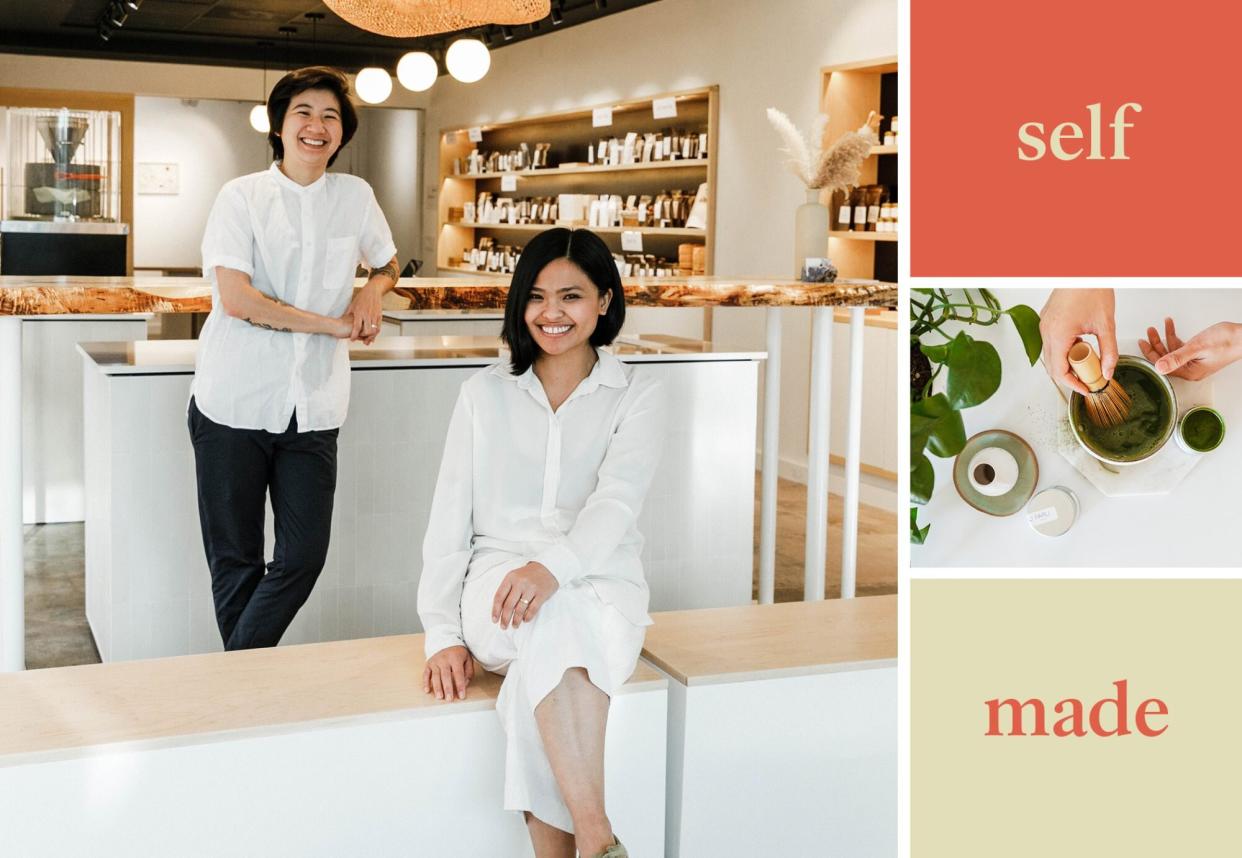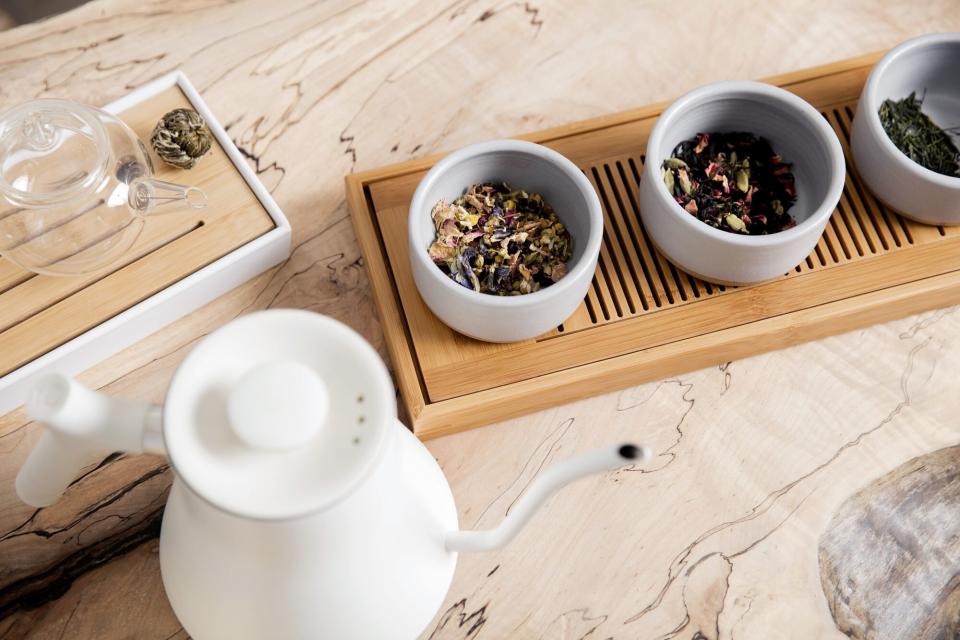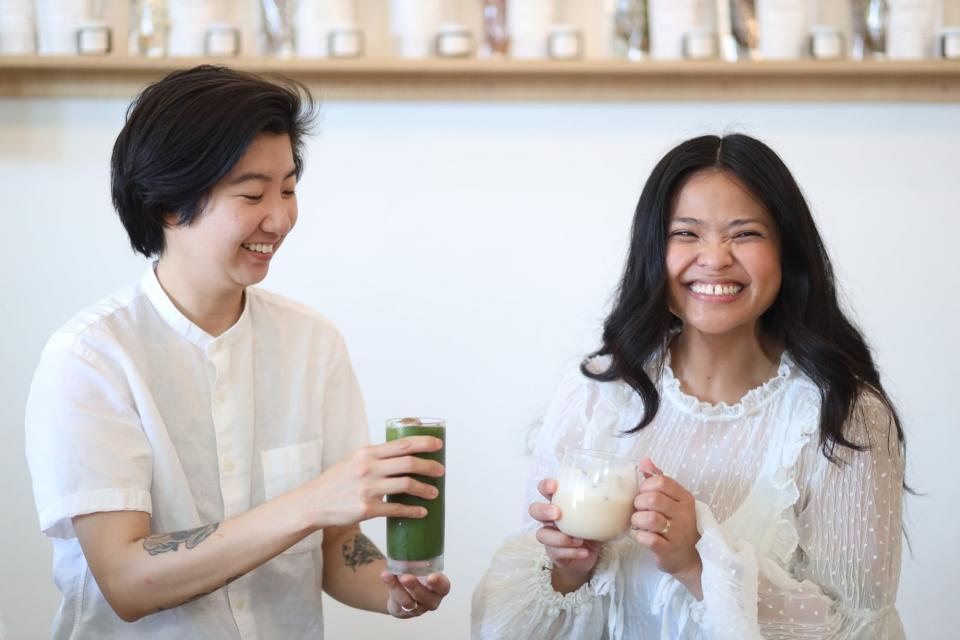Amy Truong and Lani Gobaleza of PARU Make Custom, Culturally Inspired Tea Blends to Taste and Take In

Courtesy of Studio Luniste
Have you ever wondered how to turn your dreams of owning your own business into a reality? We can help. Each week, as part of our Self Made series, we showcase female entrepreneurs—as well as their quality, handmade goods—and share their best advice related to starting, maintaining, and growing your own business.
Welcome to the world of PARU, a tea bar founded by married couple Amy Truong and Lani Gobaleza. Though their business features signature blends, primarily sourced from Southeast Asia, they grew up loving different drinks with various origins.
Truong grew up with tea and tisanes (herbal tea). "Both sides of my family are from Vietnam, but my mother spent her teenage years in Paris, where she was introduced to a variety of tisanes like chamomile and lemon verbena," she says. "My grandfather did a lot of business in Japan, so we always had green tea around the house." Gobaleza, however, grew up around coffee, as her mother lived on a vegetable- and coffee bean-filled farm.
The couple's paths and passions for tea merged after meeting during an International Studies program in Yokohama, Japan, where they both fostered an appreciation and deeper understanding of ceremonial tea rituals. Gobaleza loved learning more about the diversity of the tea for the first time, specifically Japanese green teas and matcha, along with the beautiful wares that accompany them. She moved to Japan three years later to teach for the JET Program, where she met semi-weekly with local seniors to immerse herself more with tea and the language.
From their experiences, they knew that while the drink originated in China, people prepare and indulge in it differently. Plus, sipping on tea with company can be a safe, intimate way to connect with another person. Now as the founders of PARU, Truong serving as the sourcing lead and primary tea blender and Gobaleza leading marketing and partnerships, the pair is making their own mark in the industry so others can have these positive experiences, too.
Related: How to Build a Team for Your Business

Courtesy of Meg Nobriga
PARU Principles
The duo founded PARU in May 2017 and created their tea bar on the principles of inclusivity, bringing tea access to those who may not have the opportunity to travel where it's sourced. "Through our work experiences (I worked in consulting, transportation, and wellness, while Lani worked in education, marketing, and tech), we also learned a lot about what kind of environment we wanted to create for ourselves and for our customers," Truong says. "We knew we wanted to hold space for others seeking slower, safer, healthy, and educational environments."
Their differences also proved to be the perfect combination for their work together. "Amy and I have worked together before so we knew we would work well together," says Gobaleza. "She's creative and can come up with ideas on the fly, while I'm more analytical and behind-the-scenes; it balances out well."
Establishing the Tea Bar Brand
To get PARU up and running, Gobaleza and Truong relied on their own savings and the support of their loved ones while working their full-time jobs. They started getting the word out about their brand by going to pop-ups around the San Diego, Calif., area—as farmers' markets were already filled with tea vendors. They then focused on getting brand visibility in wellness spaces, co-work spaces, holiday markets, and Instagram to establish a following and funding.
Nostalgia and our identities as Asian Americans—me as Vietnamese American and Lani as Filipino American—tend to be the inspiration for our tea blends. As people, we are 'blended,' so that's where we start.
—Amy Truong
By 2018, they opened up their warehouse, which also served as their tasting room, debuted their first brick-and-mortar in the Point Loma area the following year, and opened their second tea bar located in La Jolla in November 2021 thanks to a successful crowdfunding experience through Kickstarter. At the latter, the founders and their team offer house-milled matcha and a multi-use room that serves as a miniature art gallery and tasting room. Those outside of the San Diego area can shop their custom teas through their digital storefront.
Business of the Blends
As for how the founders get the teas they supply at PARU? They partner and establish long-term relationships with family-owned tea gardens, mainly in the Southeast Asia regions. "We take time to get to know them as people and as farmers," says Truong. "We seek out farmers and producers who value and implement organic practices, who focus on quality rather than volume. We also ask what they want from us because we want the relationship to be beneficial for them, too." They work with these farmers, some who are women and others that are first-time exporters to the United States, by traveling to them on annual sourcing trips.
"Nostalgia and our identities as Asian Americans—me as Vietnamese American and Lani as Filipino American—tend to be the inspiration for our tea blends," Truong says of their tea creation process. "As people, we are 'blended,' so that's where we start." The founders incorporate many flavors used often in Southeast Asian cooking and baking, such as coconut, ginger, and lemongrass, in their blends, like the PARU Reserve Pandan Waffle ($42, paruteabar.com), PARU Reserve Sticky Rice Pandan ($36, paruteabar.com), and PARU Ingat ($18, paruteabar.com).

Courtesy of Bhadri Khubendran
Diversifying the Industry
In their work, Gobaleza and Truong aim to create space and greater visibility of tea professionals and marginalized communities through every cup. "We hope to diversify the tea industry a bit more in terms of who is selling the tea and whose tea is being sold," Truong says. "In general, it would be great to see more women-, minority-, and queer-owned businesses in the industry. There are a few fantastic specialty tea purveyors focusing specifically on Chinese, Japanese, Taiwanese, and Indian teas, but our hope is that tea lovers will also try teas from Southeast Asia, as well as more underrepresented regions in the countries mentioned that are sometimes overlooked."
Plus, the business founders want to acquaint their customers with all things tea, particularly the environmental and health benefits of matcha and loose leaf tea. Since many people's first introduction to tea comes from coffee and boba shops, rather than experiencing the aforementioned beverages in stand-alone experiences, Gobaleza and Truong want to help personally bridge the gap with a safe and inviting environment at their tea shop.
Savoring Every Moment
Even if you are satisfied with the state of your small business, the entrepreneurs always recommend being a student to your industry and actively listening no matter what. "To maintain success, it's important to leave room for surprises and the voices of others," Gobaleza says. That being said, both tea experts say to build experience first, if it's an option, that way you have tools in your back pocket you can reference, and you can work with existing systems at established companies to save you time in the long run.
As of now, Gobaleza and Truong are setting their sights on building more community programs in San Diego by partnering with other local experts in the tea and craft spaces. "If there's anything we've learned, it's that you can't grow alone," says Truong. "Long-term, we would like to expand our teas from Southeast Asia and matcha offerings."

